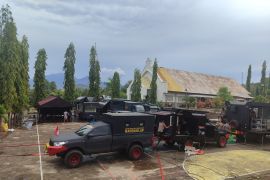"Our task is to protect (the devout). Mosques can promote public welfare, so that there are no heresies. Thats want we want. We are grateful that we have achieved that," Kalla said in his opening remarks in an international seminar held here on Thursday on the role of mosques in preventing heresies.
Kalla, who is concurrently the chairman of the Indonesian Mosque Council (DMI), said Indonesia has the largest number of mosques, notably some 800 thousand.
"That amounts to one mosque or a mushola (small mosque) for every 250 Muslims in Indonesia," he remarked at the seminar organized by the Muslim World League (MWL), or "Rabithah A Alam Al Islami."
Around 95 percent of mosques in Indonesia were built by the public, while in many Middle Eastern countries, Malaysia, Brunei Darussalam, and Pakistan, mosques were built by the government.
"Therefore, all of the imams (leaders of the prayers), and khatibs (preachers of the sermons) there are personnel of the government, unlike in Indonesia. In Malaysia, when a khatib begins his sermon, he will first pray for the Sultan, the government. In Indonesia, they begin by criticizing the government," he added.
Although it wont be easy, the government will coordinate with the mosques, particularly regarding the use of loudspeakers in order to prevent social problems in the community, he noted.
The seminar was highlighted by a dialogue and a discussion led by several key persons, including MWL Secretary General Prof. Abdullah A At Turki, Indonesias third President B.J. Habibie, deputy chairman of the Peoples Consultative Assembly Hidayat Nurwahid, and great imam of Istiqlal Mosque, KH Nasaruddin Umar.
The MWL is the worlds largest non-governmental organization established on May 18, 1962, and is headquartered in Mecca.
It is officially present in Indonesia based on a memorandum of understanding (MoU) reached with the Ministry of Religious Affairs. The MoU acts as an umbrella for all MWL activities in Indonesia. The MWL representative in Indonesia is Fahd M.S. Al Harbi.(WDY)









